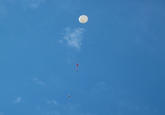High Altitude Balloon Videos
Confirmed 21,313
Part of a series on GoPro. [View Related Entries]
High Altitude Balloon Videos
Part of a series on GoPro. [View Related Entries]

About
High Altitude Balloon Videos depict a view of the Earth from an high altitude of the atmosphere. These videos are typically produced with a high altitude flying camera, which can be assembled using a weather balloon, a digital recording device and a Global Positioning System tracker. In the United States, these balloons are regulated by the Federal Aviation Administration under FAR101 restrictions.
Origin
Human attempts at high altitude exploration of near space date back to 1783 when French physics professor Jacques Charles invented hydrogen-filled balloons.[1] Charles and mechanical engineer Nicolas Robert launched the first untethered balloon on December 1st of that year.[14] The technology moved forward in the 1980s with the development of Amateur Radio High Altitude Ballooning (ARHAB)[2], pioneered by amateur radio hobbyist Bill Brown, known by his handle WB8ELK.[15] On August 15th, 1987, Brown launched the first balloon with his modern amateur radio transmitter. The Loudoun Amateur Radio Group of Northern Virginia began a series of similar experiments in 1999[19], followed by the inception of Balloon Experiments with Amateur Radio (BEAR)[16] in May 2000 by a group of Canadian amateur radio operators from Edmonton, Alberta (shown below, left).
The ARHAB programs remained mostly an exclusive activity for scientific research purposes until the 2000s, when the costs of Global Positioning System (GPS) technology and digital cameras began to fall. As a result, high altitude ballooning became a more common hobby among amateurs and space enthusiasts. Some of the earliest clips of recorded footage were uploaded onto the website of CosmoCam[9] (shown above, right), a project launched in February 2002 by Rocket Science Inc. in collaboration with NASA and the Columbia Scientific Balloon Facility.
Spread
ARHAB.org[25] was registered in August 2005 as a repository where people can learn about ballooning, share the results of their missions or seek out other people’s projects. Bill Brown also continued to experiment with ARHAB balloons, documenting the process on his home page as early as December 27th, 2005.[17] Six months later, on May 25th, 2006, the High Altitude Balloons group was launched on Flickr[23] to share images captured during these flights. Brown began uploading videos from his missions to his YouTube channel[18] in January 2007. That month, the MIT Radio Society launched a Balloon Program[20], which became inactive after its only successful flight on January 29th. Almost a month later on February 27th, Hacked Gadgets[21] featured a project called the High Altitude Balloon Experiment[22], detailing writer Bre Pettis’ construction of a digital camera-bearing balloon. After its unsuccessful flight attempt in April 2007, Pettis documented his experience on MAKE magazine.[10]

Seven months later in October 2007, Alexei Karpenko[5] successfully documented his own flight using a system consisting of GPS, camera, sensors and communications. The balloon took panoramic pictures and videos during the course of its travel and reached a maximum altitude of 30 kilometers before descending. Along with a detailed description of the preparations, photos and videos from Karpenko's mission were published in a blog post[5], which spawned over 9,900 comments. The story gained a larger audience when it was featured on tech news blog BoingBoing[3] later that month.
In September 2009, a second group of MIT students, now led by Justin Lee and Oliver Yeh, launched a Canon A470 compact camera with a weather balloon into the stratosphere, which became known as the Project Icarus. The story was covered by numerous tech news sites like Wired[12] and CNN[24] due to its low cost, totaling at $150 in equipment purchases. Additionally, High Altitude Ballooning has been featured on science news sites including Universe Today[26], Hack a Day[27] and Hobby Space.[28]
Notable Examples
Beginning in early 2008, numerous other amateur videos of high altitude balloon flights were uploaded onto video-sharing sites YouTube[8] and Vimeo.[11] As of August 2012, there are approximately 1400 videos hosted between the two sites. The caliber of image quality varies across a wide range from mobile camera resolution to high-definition; some equipment will carry toy figurines and other small objects onboard for decoration purposes. Additionally, a number of commercial brands like Toshiba (shown top, left), Google Droid and Natural Ice beer (shown top, right) have adopted the format as part of their viral marketing campaigns.
Search Interest
External References
[1] Wikipedia – High-altitude balloon
[2] Wikipedia – Amateur Radio High Altitude Ballooning
[3] BoingBoing – DIY Balloon Sent Up
[4] Parallax – Near Space
[5] HALO – Helium Balloon Mission to Near-Space
[6] BoingBoing – DIY Balloon Sent Up
[7] Vincent McDermott – Space Race for DIYers
[8] YouTube – Results for High Altitude Balloon Videos
[9] CosmoCam – About the Project
[10] MAKE Magazine – Near Space Balloon Update: The Ultimate Easter Egg Hunt
[11] Vimeo – Search Results for High Altitude Balloon Videos
[12] Wired – The $150 Edge-of-Space Camera: MIT Students Beat NASA On Beer-Money Budget?
[13] W6XE – Balloon v1.0
[14] About.com – History of Airships and Balloons
[15] WB8ELK Balloon Flights – Home
[18] YouTube – WB8ELK's channel
[19] K4LRG – The Great LARG Balloon Launch Of 1999
[20] MIT Radio Society – Balloon Program
[21] Hacked Gadgets – High Altitude Balloon Experiment
[22] PBWiki – High Altitude Balloon Experiment
[23] Flickr – High Altitude Balloons
[24] CNN – Students launch camera to edge of space, snap pics of Earth
[26] Universe Today – Satellites on a Budget – High Altitude Balloons
[27] Hack A Day – High altitude balloons
[28] Hobby Space – Near Space

















Top Comment
brainpeel
Jan 28, 2012 at 08:42AM EST